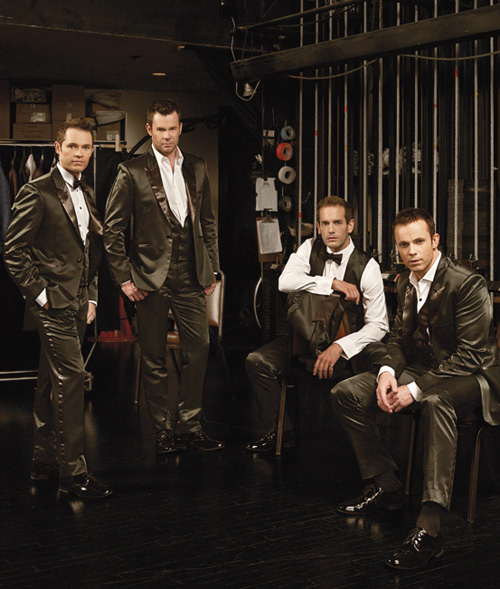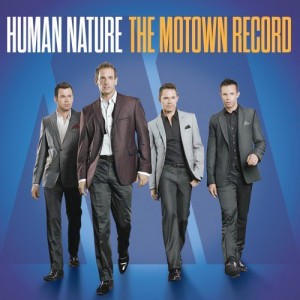The ‘Human’ Condition

An interview with Toby Allen, out gay member of Human Nature
by Gregg Shapiro
Sometimes it seems like you can’t turn on your local PBS station without seeing Australian vocal group Human Nature performing their faithful and respectful renditions of songs from the Motown songbook. The quartet’s latest release, The Motown Record (Ume), finds the dudes from down under teaming up with Smokey Robinson on “Get Ready,” singing a cappella on “Ooo Baby Baby” and “Just My Imagination (Running Away with Me),” and applying their natural brand of humanity on classics such as “Stop! In the Name of Love,” “Dancing in the Street,” and, of course, “Reach Out I’ll Be There,” among others. I spoke with Toby Allen, the out gay member of Human Nature, about the group in early 2012.
Gregg Shapiro: Toby, I’d like to begin by asking you about the name of the group, Human Nature. How did it come to be and were you involved in the band-naming process?
Toby Allen: Yeah, absolutely. We were actually a vocal group singing together for a number of years before we changed our name. We were called The Four Trax, which was actually a nod to a lot of the Motown groups, such as The Four Tops, because that was the music that we listened to. But when we were starting our recording career, we started wondering if people were really going to get into a group called The Four Trax in this day and age. So we felt we had to change our name. We brainstormed and we had pages and pages of names. I think there was Human-something and Something-nature. We were trying all sorts of different combinations. It might’ve been Mike, I think, who suggested putting the two together. At first we thought it was probably a bit obvious, because it’s such a well-used term, but then the more we lived with that, we realized that it felt that it suited us. We were singing a cappella at the time, and it represented what we were about; singing was our human nature. We felt it was a really great name for us.
 Prior to recording your latest album of Motown hits, had you and your band mates been to Detroit, the Motor City?
Prior to recording your latest album of Motown hits, had you and your band mates been to Detroit, the Motor City?
We didn’t before the first album. We’ve actually recorded three Motown records in Australia. There were so many songs to choose from. We did the first one, and it ended up being the highest-selling album of that year in Australia. There were so many songs that we weren’t able to fit on that first record that we did a second, and it was also very successful. So we decided to try and approach a third. But we were thinking, How can we possibly do this in a different way, to excite people again about us doing Motown? We thought, Let’s try doing duets with some of the original [Motown] artists. The people we asked all said yes. Smokey Robinson, The Temptations, Martha Reeves, and Mary Wilson from The Supremes. In doing that, we took a trip over to the states and went to Detroit. Martha Reeves was our tour guide through Hitsville, which was very cool [laughs]. She told us amazing stories about doing backing vocals for Marvin Gaye, singing into the same mic as him. We got to go into the studio and have a bit of a sing, which was very cool. And on that same trip we came to Vegas and met Mary Wilson and then went to L.A. and met The Temptations and Smokey while they were all recording for the album. It was the perfect way to approach doing that third record. And it also gave us an introduction to Smokey, who has now become a real mentor of ours and loves what we’re doing.
An honorary member as well?
[Laughs] When you say it that way, it sounds fantastic.
Being from Australia, why do you think the music of Motown endures where you’re from?
That’s actually quite interesting because when a lot of Motown songs were first released back in the ’60s, they weren’t necessarily [performed by] the original artists. A lot of Australian artists actually covered Motown songs and had hits with them before the original artists were known for them. The music was global. It was a huge hit all around the world. Australia certainly came to know Motown for its original artists. The music’s intention was to be for everybody. That’s what Smokey said to us about when he and Berry Gordy originally started Motown. They didn’t want to make black music. They wanted to make music for everybody. To think that that music spread all around the world and 30 years later this vocal group from Australia was inspired by that music is a testament to how great and timeless the music is. It’s written with such integrity and quality that it’s bound to endure.
What do you think Human Nature brings to songs such as these that others haven’t?
I think because we grew up listening to this music and being inspired by it. Growing up in Australia, we weren’t living in a culture of vocal groups necessarily, because it was such an American thing. Your tradition of vocal groups is so strong, in schools and colleges. In Australia it’s very different. We grew up in a very rock-band era: INXS, Midnight Oil, AC/DC. Australia was more renowned for its rock. When we were singing together, we had to look further afield for our inspiration—22 years ago we started listening to that music and really were inspired by the harmonies of Motown, regardless of whether it was a group or not. Most Motown songs have fantastic harmonies, even if it was a solo singer. There was so much there for us to draw from that I think, after 22 years of listening to and being inspired by that music, we have a great understanding of and passion for it. I think that’s what we bring to it.
If you had to choose an all-time favorite Motown song, what would it be?
[Groans]It’s so tough to do. It probably changes daily. I know that, different nights performing our shows, I loved performing particular songs more than others. But I think “Reach Out (I’ll Be There)” is a classic Motown song. Oddly enough, we sang that at a school concert in our early days. I think we were still in high school. When it came time to do our first Motown record and we were thinking of songs to include, it was an obvious one that came up as a possibility. [Laughs] I actually said to the guys that I wasn’t sure about doing that. But I was proved absolutely wrong. It was the first song really performed on national TV and it kicked everything off for us. [Laughs] I had to eat my words, because it’s become the song that kicked off this whole Motown thing for us, and we rarely do a show without performing that song. It’s the very last song that we do in our show at the moment. It gets people on their feet, singing and doing the moves. It’s so infectious.
I’m glad that you mentioned “doing the moves,” because I have to ask you if there are specific challenges to dancing in tuxedos?
[Laughs] Yes! It’s probably not the ideal thing to wear. When we’re wearing the tuxedos at the start of the show, we’re also wearing ruffled shirts, so there’s like an extra layer there as well. It gets pretty hot. But that was part of the appeal of Motown, as well. They took such pride in their presentation and how they presented their music. It wasn’t just throw it out there without any regard for style. Obviously they were also trying to appeal to a part of the community that they had to impress. One of their biggest aims was to perform for the queen. I remember seeing a documentary that talked about how, for the time they were living in, that was such an aspiration to get to that level of society—and they did. I think it was through doing the moves and at the same time doing it in a very stylish, well-manicured approach. We wanted to maintain that part of the magic of that era and have an essence of it. Not copy it, but have at least a nod to what they were doing.
You mentioned television, and Human Nature has become quite popular with the American PBS—public television—audiences in America. Why do you think that is?
It’s because we went after it. [Laughs] We arrived in Vegas as complete unknowns. Very few people knew us in America. We were trying to think of ways to get to the American public. We’re sort of doing it in reverse, because normally as a recording artist you would make a record, release singles, and build an awareness with the public and then get on TV. We landed ourselves in Vegas to get our show up and running, and somebody suggested to us that we seriously consider getting onto PBS. We knew they were very supportive of the arts and supportive of new talent. We spent a while formulating how we were going to approach it, and we ended up funding the majority of the production for filming our show for the TV special. The people from PBS saw our show and loved what we were doing. The music is such a great match for them, and their audience as well, because they have such a broad audience and Motown has such broad appeal. It’s a perfect match. They’re very supportive of us and the people watching—the people that love Motown—as well. It’s a great combination. We hope to do more with them in the future.
What would you say are the pros and cons of being the gay member in a group such as this?
I don’t think of it in those terms. [Laughs] I certainly don’t think there are cons. Maybe the biggest con is that there’s a bit during our show where I get a woman to touch my ruffled shirt. So maybe I’m being the biggest con [laughs] at that point in the show. When I’m on stage, I don’t differentiate like that. I’m the performer and that’s what I love doing.
Are you aware of a gay following for Human Nature?
Not so much here, at this point. I know back in Australia we had a gay following. We’ve done a number of things to support that. We performed at the huge party, Sydney Gay and Lesbian Mardi Gras, back in 2000. It’s a big dance party and we performed at 4 a.m. [Laughs] It was one of the most unique experiences that we’ve all had performing. From our pop days, we had quite a young female following. So we were used to screams and cheers. When we came on stage at this [Mardi Gras] party, there was this mighty, manly roar. It was something we hadn’t experienced up until that point and have never experienced since. We performed “I’m Your Man.” It was a lot of fun. You have to embrace the moment, and we certainly did. It’s great to know that anybody can get into what we’re doing, and we appreciate all the support we get.
Human Nature performs at Verizon Wireless Theater on April 14 at 8 p.m. For more on Human Nature, visit humannaturelive.com.
Gregg Shapiro is a regular contributor to OutSmart magazine.











FB Comments